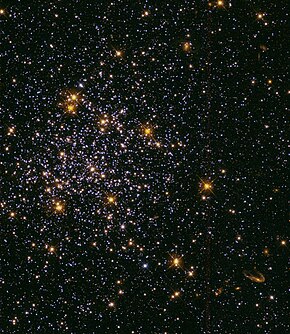NGC 152
| NGC 152 | |
|---|---|
 NGC 152 as seen from the Hubble Space Telescope | |
| Observation data (J2000 epoch) | |
| Right ascension | 00h 32m 56.26s[1] |
| Declination | −73° 06′ 56.6″[1] |
| Apparent magnitude (V) | 12.26[1] |
| Apparent dimensions (V) | 3.00′ × 3.00′[2] |
| Physical characteristics | |
| Mass | 2.5×104[3] M☉ |
| Estimated age | 1.40±0.20 Gyr[3] |
| Other designations | ESO 28-24[4] |
| Associations | |
| Constellation | Tucana |
NGC 152 is an open cluster in the constellation Tucana. It was discovered by John Herschel on September 20, 1835.[5] It is located within the Small Magellanic Cloud.[1]
NGC 152 is about 1.40 billion years old. Its estimated mass is 2.5×104 M☉, and its total luminosity is 8.0×104 L☉, leading to a mass-to-luminosity ratio of 0.31 M☉/L☉.[3] All else equal, older star clusters have a lower luminosity for the same mass; that is, their mass-to-luminosity ratios are higher.[3]
See also
References
- ^ a b c d Rafelski, Marc; Zaritsky, Dennis (2005). "The Star Clusters of the Small Magellanic Cloud: Age Distribution". The Astronomical Journal. 129 (6): 2701–2713. arXiv:astro-ph/0408186. Bibcode:2005AJ....129.2701R. doi:10.1086/424938. S2CID 4600017.
- ^ Bica, E.; Dutra, C. M. (2000). "Updating the Census of Star Clusters in the Small Magellanic Cloud". The Astronomical Journal. 119 (3): 1214–1224. arXiv:astro-ph/9912386. Bibcode:2000AJ....119.1214B. doi:10.1086/301277. hdl:10183/108234. S2CID 119350474.
- ^ a b c d Song, Ying-Yi; Mateo, Mario; Bailey, John I.; Walker, Matthew G.; Roederer, Ian U.; Olszewski, Edward W.; Reiter, Megan; Kremin, Anthony (2021). "Dynamical masses and mass-to-light ratios of resolved massive star clusters – II. Results for 26 star clusters in the Magellanic Clouds". Monthly Notices of the Royal Astronomical Society. 504 (3): 4160–4191. arXiv:2104.06882. doi:10.1093/mnras/stab1065.
- ^ "NGC 152". SIMBAD. Centre de données astronomiques de Strasbourg. Retrieved 2021-02-06.
- ^ "New General Catalog Objects: NGC 150-199". Retrieved 2016-06-11.
External links
 Media related to NGC 152 at Wikimedia Commons
Media related to NGC 152 at Wikimedia Commons
